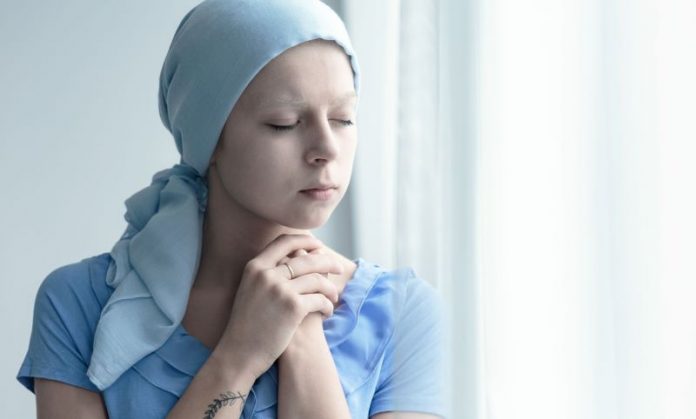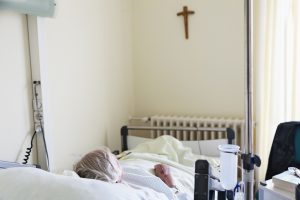
A priest shares his experiences from both sides of the sacrament
FR. GEORGE “CHIP” HINES
When I was asked to write this article, the first thought I had was Oh sure, I get the hard one to write about. However, as I began formulating what I wanted to say, I realized that, in fact, I had received a rich assignment.
Most people, when talking to me about the sacraments, will bring up Baptism and Eucharist. If I converse with them long enough, they may also mention Penance and Matrimony, perhaps Confirmation. But Holy Orders or Anointing of the Sick seem to be way down on the list in many people’s minds, if mentioned at all. (My job isn’t to talk about Holy Orders here, but remember that none of the seven sacraments happen without Holy Orders. So, please pray for more priests and deacons! But I digress.)
Anointing of the Sick is often a misunderstood sacrament. I would guess that some Catholics still do not know it by this name. Many would probably call it “last rites.” If they are older Catholics, able to recall the pre-Vatican II years, they knew it then as Extreme Unction. “Last rites” is very common because in the media a fictional priest will often call it that. The last rites, in truth, are actually more complicated. They not only include the Anointing of the Sick, but a final confession and the administering of the Viaticum, a final Communion to prepare for the journey through death to the afterlife. Yet for the purpose of this article, I’ll stick to the Anointing of the Sick to keep this clear and simple.
The sacrament’s rite
The very Scripture and the prayer we use when celebrating the sacrament is this: Lord God, you have said to us through your apostle James: “Are there people sick among you? Let them send for the priests of the Church, and let the priests pray over them, anointing them with oil in the name of the Lord. The prayer of faith will save the sick persons, and the Lord will raise them up. If they have committed any sins, their sins will be forgiven them.”
Lord, we have gathered here in your name and we ask you to be among us, to watch over our brother/sister. We ask this with confidence, for you live and reign forever and ever. (From Pastoral Care of the Sick)
St. James lays it out clearly: The sick need this sacrament, and the sick might be dying or very ill. People in either situation need prayers and grace. The priest or bishop is also needed to celebrate the sacrament. St. James spells that out, too. He does not say “send for the farmers”; he says, “Summon the presbyters of the church” (James 5:14).
All valid sacraments need both form and matter. The form contains the words (or prayers)
or actions associated with the sacrament. The matter refers to the materials or prerequisites needed for the sacrament.
With Anointing of the Sick, the prayer, or essential form, comes from the Pastoral Care of the Sick, the ritual book we use when celebrating the sacrament:
Through this holy anointing may the Lord in his love and mercy help you with the grace of the Holy Spirit. May the Lord who frees you from sin, save you, and raise you up.
The matter of the sacrament is the Oil of the Sick, along with the laying on of hands by the priest. Both the power of the prayers and the anointing bring God’s strengthening to a person.
Those who are seriously ill need the special help of God’s grace in this time of anxiety, lest they be broken in spirit and, under the pressure of temptation, perhaps weakened in their faith. This is why, through the sacrament of anointing, Christ strengthens the faithful who are afflicted by illness, providing them with the strongest means of support. (Pastoral Care of the Sick)
The grace that is imparted may not cause a physical healing, but a spiritual healing may be the very thing a sick person needs. A physical healing is possible, of course, but that depends on God, not the priest.
Who can be anointed?
 Recipients for this sacrament can certainly be anybody going in for surgery, or elderly people who might be frail but not dying. Sick children who have reached the age of reason may receive it, as well as the gravely ill and the dying.
Recipients for this sacrament can certainly be anybody going in for surgery, or elderly people who might be frail but not dying. Sick children who have reached the age of reason may receive it, as well as the gravely ill and the dying.
So, you see, this sacrament is about healing the body and soul, and one does not have to be near death to receive it. I’ll explain more about the importance of when to call a priest later, but if someone is facing these situations, do call for a priest. You are not bothering us with such a request! (Learn more in the Helpful Resources box.)
My story
Of the seven sacraments, I have received six. (Obviously, as a priest I will not receive Holy
Matrimony.) However, I have received the Anointing of the Sick a few times in my life. And while I’ve never felt a true physical healing miracle, I have felt the spiritual healing this sacrament brings.
I have recently recovered from a long medical leave of absence. I have spent more time in hospitals, rehab centers, and doctors’ offices in the last two years than I care to remember. Sparing you the details, let us just say I was very ill, and I almost lost my right leg. During the worst of it, my spirits were down, and I was in, as the saying goes today, a bad headspace.
During one of my hospitalizations in Boston, a priest I did not know — and have not seen since he visited me — was filling in for the chaplain at the hospital. This visiting priest came in my room and asked how I was doing. I summoned my energy to be polite and said, “As good as I can be,” and he laughed. I laughed a little, too, and introduced myself. When I told him that I was a priest his eyes seemed to open wider, and he sat down in my visitor’s chair. All of a sudden, this sick call had become more interesting, and he began asking me questions about my current assignment and where I had served in the past, as well as asking where I grew up and which seminary I had attended. We got to know each other a little bit. Or, I should say, he got to know me — because I was so involved with my situation, I honestly could not tell you this priest’s name!
After a while he asked me if I wanted to receive the Anointing of the Sick and I said, “Absolutely.” He got busy with his preparations. He unrolled his little purple stole and kissed it gently before placing it on his shoulders. Next he unscrewed the cap on his oil stock that contains the Oil of the Sick. Lastly, he got his ritual book ready, placing the ribbons in their proper places. He was ready for business, and so was I.
He began with the Sign of the Cross, and even before he laid his hands on my head, I began to feel more relaxed. And it is hard to explain in words, but I felt … relieved, as if a huge burden had been lifted off me.
I had been on the other side of this sacrament so many times, and here I was receiving it — and finally feeling the sense of peace and serenity it gives to the Catholics who desire the grace that is offered. However, I am certain that each person who receives this sacrament has a reaction, or response, that is unique to them. It is deeply personal to receive the Sacrament of the Anointing of the Sick.
The effects of Anointing
 As a priest on the dispensing side of the Anointing, I have seen the sacrament’s dramatic effects. No, I haven’t seen any miraculous healings, but I hold out hope that I will someday. Yet I have seen miracles — just not the kind you might be thinking about.
As a priest on the dispensing side of the Anointing, I have seen the sacrament’s dramatic effects. No, I haven’t seen any miraculous healings, but I hold out hope that I will someday. Yet I have seen miracles — just not the kind you might be thinking about.
I have seen people in great physical distress be calmed from their pain from my touch when offering the prayers and anointing with the oil. From a priest’s perspective, the first time you see that, it changes your life.
As a young priest, I lived in a parish with a large aging population. I was called out to homes and the hospital quite often for the Anointing. I met many elderly people who were dying. But after the sacrament, on my way out the door, it was almost always said to me by others that their loved one had become calm when I was administering the sacrament, that the recipient of the anointing had seemed to find some peace.
I can now attest to this through my experience on both sides of the sacrament.
Don’t wait to call a priest
I love those calls to visit the sick. And here’s my best advice, so please share it widely: Most people will wait till the end of someone’s life to celebrate this sacrament. This is most unfortunate. And if I can change anything by writing this article, I hope it is this: We will always come in an emergency. But if it is at all possible, I encourage family members or friends to call for a priest while the sick person is still able to participate in the sacrament.
The number one priest complaint in the world is that we wish people would call us sooner rather than later. Having someone who is alert and can understand that the Anointing of the Sick is happening, in my experience, is the optimal way to celebrate this sacrament. When the person can respond to the prayers themselves and truly pray along with us, Anointing of the Sick takes on a completely different complexion. It becomes a moment of exchange.
For example, I met with a wonderful older woman on a monthly basis in the first few years of my priesthood. She was 98 years old when I first met her and still lived at home alone. Every month when we met, I’d anoint her and give her Communion. The thrill of it for her was the grace she so obviously received. I truly believe it was this sacrament that helped her hang on for her 100th birthday — and I was invited to the party, a great honor. This faith-filled woman died shortly after that party, but she had lived a great life and was truly a believer. The Sacrament of Anointing of the Sick was an important part of her life in those last years that brought her peace and strength.
I once had an experience in the hospital that was both beautiful and a little unnerving at first. As I made my rounds, the last patient I saw was unconscious, and despite my best efforts, she would not wake from her rest. So, being an earnest young priest, I began the Anointing. As I reached the part where I use the oil to anoint the palms of her hands, she grabbed my arm. So I stopped — somewhat frozen — and called out her name. She didn’t respond. But after carefully prying my arm away, I completed the ceremony and sat in the chair next to the bed. I sat there for 45 minutes, wondering and occasionally trying to get her to wake up, but to no avail. I left the room and learned a few days later that she had died. I still believe to this day that the power of Jesus and the grace of the sacrament somehow allowed that soul to reach out for Christ, in the person of the priest.
As I sit back and ponder that, I cannot help but go happily to every sick call — no matter the time, the weather, or my own physical exhaustion. Those souls are reaching out for Jesus Christ, and so the priest needs to be there. And the beauty of it is, with God’s help and yours, we usually are.
Fr. George “Chip” Hines was ordained in 2004 by Cardinal Sean O’Malley and has been a pastor in the Archdiocese of Boston, hosted the program Searchlight on CatholicTV and a radio show on WQOM, and has hosted or been a guest on many podcasts. He also serves on the board of SQPN.
This article was originally published in Catechist magazine, February 2020.
PHOTOS (T-B): KATARZYNABIALASIEWICZ/SHUTTERSTOCK, SILVIAJANSEN/ISTOCK, KUPICOO/SHUTTERSTOCK




